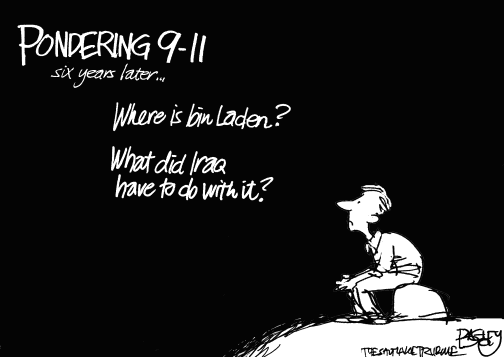Search
Democracy Links
Member's Off-site Blogs
inconvenient voices ....

Former Liberal Prime Minister Malcolm Fraser gave an interesting speech last week entitled “Finding Security in Terrorism’s Shadow: The importance of the rule of law”. It is an interesting and thought provoking speech. It is appropriately scathing of the neo-conservatives and their malign influence not just in the USA but on the globe.
But it also goes beyond that into the history, role and importance of the rule of law and how it can effectively be applied in the modern era.
The whole speech is worth reading, but one aspect I found particularly interesting was Fraser’s support for a requirement that Parliamentary approval be required before our troops can be committed to war overseas.
“….if the United States is to go to war, there must be a vote in the Congress supporting that move. I would now support a similar provision placed in the Australian Constitution. If the Government has such a weak case for war that it could not persuade a majority of both Houses of Parliament, to vote in favour of a proposed conflict, then that conflict should not be undertaken. In America, the President cannot move without such a vote from the American Congress. In Australia the Parliament now does not need to be consulted. The Australian Parliament should be given a power equivalent to that of the United States Congress.”
Of course, the Australian Senate voted against our troops being engaged in the attack on Iraq in 2003, but by the time the vote was taken, our troops were already in the field. Australia was the only country of the so-called ‘coalition of the willing’ whose engagement was not supported by a vote of their Parliament or Congress.
Parliamentary Approval for War
meanwhile, Antony Loewenstein writes ….
The Iraq war has barely registered in this election campaign (except Murdoch cheerleader Andrew Bolt declaring last week that the battle has been "won"). Clearly Bolt must have missed the millions of displaced refugees both inside and outside the ravaged country during his visit to the Green Zone. Most Iraqi bloggers remain pessimistic.
John Howard’s stated reason for Australian troops to remain in Iraq is simply to support the Americans, while Kevin Rudd has pledged to remove our combat troops from the country. But in the real world, Iraq remains in turmoil and election campaigns are never the time for sensible policy discussion, let alone accountability for the over one million Iraqis killed since the 2003 invasion.
Ali Allawi, Iraq’s former defence and trade minister, is in Australia this week talking about his country’s prospects and his acclaimed book, The Occupation of Iraq: Winning the War, Losing the Peace. Unlike fellow former Iraqi Prime Minister Ayad Allawi, who is currently angling to run the nation again, Allawi remains disillusioned with the American mission and deeply resents their numerous crimes since 2003. "It was doomed", he told the New York Times in October.
"What was doomed was the attempt to refashion Iraq in a sort of civilisational makeover, using American power in an alliance with a supposedly grateful Iraqi public, led by a Westernised middle class."
Allawi told a packed audience at Sydney’s Lowy Institute last night that the Iraqi state had "collapsed" on 9 April, 2003. A nation that has had its sovereignty violated four times in the last century is unlikely to regain its national character anytime soon, he lamented.
Iraq no longer has any kind of central authority and currently operates, with tacit American backing, as a dominant Shiite state that both oppresses the Sunni minority and empowers tribal groups to merely worsen the fragmentation. Allawi argued that even the possibility of a centralised government was highly unlikely and federalism was an equally unlikely solution. He said that many in the West didn’t accept that secular parties only gathered tiny support throughout the country and the majority had consistently voted for politicians with strong religious affiliations.
His solution – though he acknowledged this was unlikely to happen anytime soon – consisted of establishing a semi-centralised government with a large degree of decentralisation among the ethnic regions of the country, including the Kurdish minority in the north. Simply put, despite the suggestion of some politician and analysts in America, Allawi believed that Iraq should not be divided along ethnic lines.
He said withdrawal of Australian troops would make no difference to the security situation (something he agreed had slightly improved over the last months.)Allawi reminded the audience that America was responsible for Iraq’s current crisis and therefore should institute a regional conference with all the major players to discuss the country’s future.
- By John Richardson at 7 Nov 2007 - 11:30pm
- John Richardson's blog
- Login or register to post comments
Recent comments
1 hour 13 min ago
2 hours 24 min ago
2 hours 49 min ago
3 hours 20 min ago
3 hours 25 min ago
7 hours 45 min ago
10 hours 22 min ago
10 hours 32 min ago
21 hours 26 min ago
22 hours 6 min ago